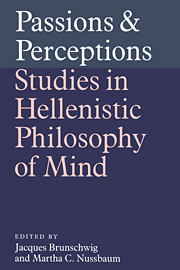Book contents
- Frontmatter
- Contents
- Preface
- Avant-propos
- Part I ETHICS AND PSYCHOLOGY OF HEDONISM
- Part II ATOMISM AND EPICUREAN PSYCHOLOGY
- Part III THE PASSIONS
- Chapter 5 Poetry and the passions: two Stoic views
- Chapter 6 Seneca and psychological dualism
- Chapter 7 Actions and passions: affection, emotion, and moral self-management in Galen's philosophical psychology
- Part IV STOIC PSYCHOLOGICAL CONCEPTS
- Bibliography
- Subject index
- Name index
- Index of passages cited
Chapter 7 - Actions and passions: affection, emotion, and moral self-management in Galen's philosophical psychology
Published online by Cambridge University Press: 22 September 2009
- Frontmatter
- Contents
- Preface
- Avant-propos
- Part I ETHICS AND PSYCHOLOGY OF HEDONISM
- Part II ATOMISM AND EPICUREAN PSYCHOLOGY
- Part III THE PASSIONS
- Chapter 5 Poetry and the passions: two Stoic views
- Chapter 6 Seneca and psychological dualism
- Chapter 7 Actions and passions: affection, emotion, and moral self-management in Galen's philosophical psychology
- Part IV STOIC PSYCHOLOGICAL CONCEPTS
- Bibliography
- Subject index
- Name index
- Index of passages cited
Summary
Galen is remembered mainly as a doctor; and it is on his fame as a medical theorist and practitioner that his reputation principally rests. Yet he was no mere physician; he thought of himself as equally a philosopher, and if the tradition has been less kind to his strictly philosophical works than to his medical writings (here as elsewhere interest has to a large extent dictated survival), none the less enough of his philosophical temper shines through his medical oeuvre for us to be able to judge his claims to that title.
For Galen, fortunately (although at times infuriatingly), was not a dry and merely technical writer. On the contrary, his massive corpus abounds with digressions, asides, interludes; irrelevant hares are started, pointless chimerae chased. If Galen insists (as he does to the point of tedium) that his wordiness is the direct result of the idiocy of those whom he has to refute, he himself cannot be acquitted of the charge of prolixity and verbosity; even when hymning the philosophical and literary advantages of brevity, he does so at extravagant length. Galen loved the sound of his own voice.
And it is lucky for us that he did. For it is in those asides and irrelevances that we find a pot-pourri of scattered remarks and fragments of enormous philosophical importance. It is to Galen's exuberant largesse that we owe much of our knowledge of the schools of later Greek philosophy; and that debt has long been acknowledged.
- Type
- Chapter
- Information
- Passions and PerceptionsStudies in Hellenistic Philosophy of Mind, pp. 184 - 222Publisher: Cambridge University PressPrint publication year: 1993



